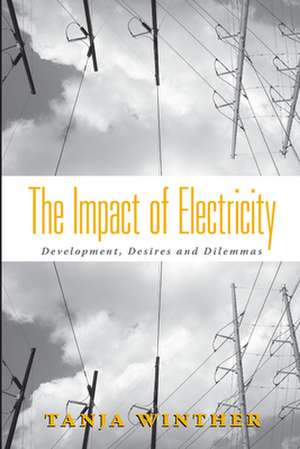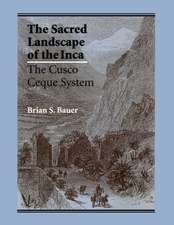The Impact of Electricity
Autor Tanja Wintheren Limba Engleză Paperback – 31 oct 2010
How does everyday life change when electricity becomes available to a group of people for the first time? Why do some groups tend to embrace this icon of development while other groups actively fight against it? This book examines the effects of electricity's arrival in an African, rural community. Based on ethnographic fieldwork in Zanzibar at different points in time, the author provides a compelling account of the social implications in question. The rhythm of life changes and life is speeding up. Sexuality and marriage patterns are affected. And a range of social relations, e.g. between generations and genders, as well as relations between human beings and spirits, become modified. Despite men and women's general appreciation of the new services electricity provides, new dilemmas emerge. By using electricity as a guide through the social landscape, the particularities of social and cultural life in this region emerge. Simultaneously, the book invites readers to understand the ways that electricity affects and becomes implicated in our everyday life.
Tanja Winther has a Masters in Power Engineering and a Doctorate in Social Anthropology. She is at the Centre for Development and the Environment (SUM) at the University of Oslo.
| Toate formatele și edițiile | Preț | Express |
|---|---|---|
| Paperback (1) | 260.57 lei 6-8 săpt. | |
| BERGHAHN BOOKS INC – 31 oct 2010 | 260.57 lei 6-8 săpt. | |
| Hardback (1) | 750.20 lei 6-8 săpt. | |
| BERGHAHN BOOKS INC – 31 aug 2008 | 750.20 lei 6-8 săpt. |
Preț: 260.57 lei
Nou
Puncte Express: 391
Preț estimativ în valută:
49.86€ • 52.20$ • 41.26£
49.86€ • 52.20$ • 41.26£
Carte tipărită la comandă
Livrare economică 05-19 aprilie
Preluare comenzi: 021 569.72.76
Specificații
ISBN-13: 9781845452926
ISBN-10: 1845452925
Pagini: 274
Dimensiuni: 152 x 229 x 15 mm
Greutate: 0.37 kg
Editura: BERGHAHN BOOKS INC
ISBN-10: 1845452925
Pagini: 274
Dimensiuni: 152 x 229 x 15 mm
Greutate: 0.37 kg
Editura: BERGHAHN BOOKS INC
Notă biografică
Tanja Winther has a Masters in Power Engineering and a Doctorate in Social Anthropology. She is at the Centre for Development and the Environment (SUM) at the University of Oslo.
Cuprins
List of illustrations Acknowledgements List of abbreviations Chapter 1: Introduction Towards an anthropology of energy Addressing development Research questions The choice of an untypical village Electricity matters What sort of good is electricity? Fieldwork and ethical considerations Learning 'the art of conversation' An outline of the book Chapter 2: Powers of the past The people and the place The colonial period The post-revolution era Chapter 3: The Rural Electrification Project (RUREL) Objectives: improve health facilities, create modern villagers and ensure Zanzibar's future income The impact of international environmental discourses Political difficulties: the project interrupted Public services dramatically improved Household connections, tourism and productivity A summary of the immediate effects of electricity's arrival Chapter 4: Electrifying Uroa Uroa becomes connected The significance of a meal A passion for meetings Women's limited role in the process Creativity and capability - participation practised The limits to local control Finding equivalence Explaining conflict and resistance Development as a political matter Chapter 5: Discourses of development Unreliable markets The generation of money in Uroa Education as an icon of development Religious, modern Zanzibar Television Zanzibar (TVZ) Towards increasing difference Chapter 6: The electricity company in the village Linked to the developed world Entering private space Measuring proper behaviour Payment time: humbleness and resistance The consumption of electricity: a high awareness of the cost Problems caused by the accounting system Disconnection Striving to behave like modern customers Chapter 7: Uroa by night Light as a marker of power The aesthetics of darkness Security light Demographic changes, men, and their houses Speeding up life - consequence and ideal? Uroa transformed Chapter 8: Introducing objects of desire Strategies for obtaining electrical appliances Women's wealth Explaining women's exclusion from the ownership of appliances Putting yourself at risk Normalisation: balancing equality and difference Chapter 9: Reorganising interior space Relaxing in Uroa The home as a stage Reorganising space and social relationships Encapsulating the family Chapter 10: Negotiating tastes in food Cooking with electricity Zanzibari tastes Food as a social marker A cook's technologies and concerns Taste and conflicting discourses Food and body Tastes at rest, tastes in flux Chapter 11: Electricity makes a difference What does electricity promise? Electric networks in their creation Electrification and human well-being Environmentally sustainable development Are kinship relations losing significance? Negotiating gender relationships Electrified worries and the need to get in control 'You don't tell someone with a bike to buy himself a car!' Glossary of Swahili terms Bibliography References Reports Archival sources (Zanzibar National Archives) Index
Recenzii
"Partly the report of a development project, partly an ethnography, and partly a discourse on development anthropology, [this book] is a fascinating and significant work - an informative and thought-provoking book. Its nuanced discussions of electrification's effects on Uroans are a valuable empirical contribution to studies of technological change." * American Anthropologist "Tanja Winther's excellent study clearly shows the insights anthropological analysis brings to understanding development investments, even ones which might be thought to be purely technical in nature. Anyone responsible for designing, implementing or managing rural electrification programs in Africa, is strongly advised to read this book" * Howard White, Executive Director, 3ie

















